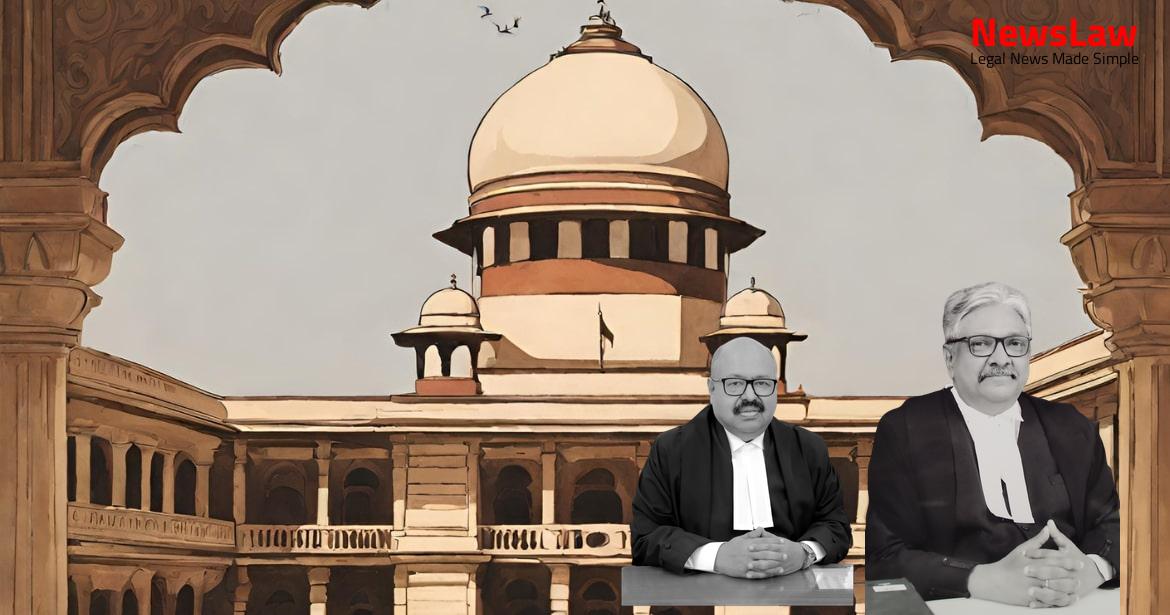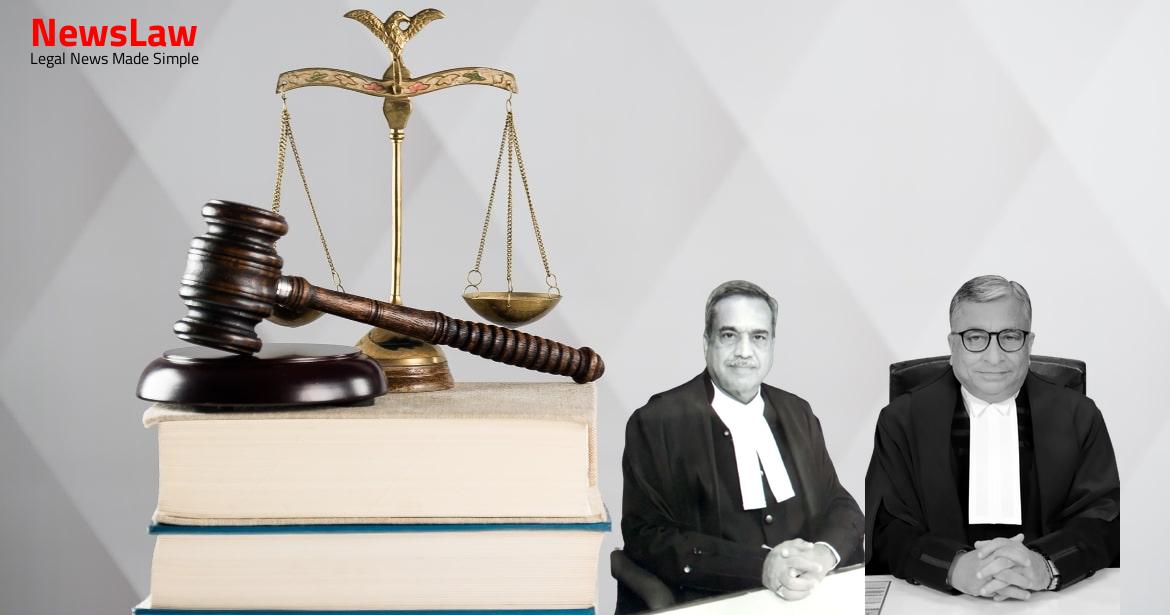The recent legal analysis delves into the applicability of gratuity rights for Anganwadi workers in India, showcasing the court’s emphasis on social security measures for employees. The case sheds light on the crucial role played by Anganwadi workers/helpers in society and the potential impact on extending gratuity benefits to organized and unorganized sectors. Stay tuned to discover more about this significant legal decision.
Facts
- The appellants are Anganwadi workers and/or their organisations.
- The issue involved in these appeals is whether Anganwadi workers and Anganwadi helpers appointed to work in Anganwadi centres under the Integrated Child Development Scheme are entitled to gratuity under the Payment of Gratuity Act, 1972.
- The Judgment of the Division Bench is the subject matter of challenge before this Court.
- The learned Single Judge dismissed the writ petitions.
- The appeals arise out of writ petitions filed by the District Development Officer and two other officers for taking exception to the orders passed by the Controlling Authority under the 1972 Act.
- The finding rendered by the Controlling Authority which was confirmed by the Appellate Authority was that Anganwadi Workers (AWWs) and Anganwadi Helpers (AWHs) are entitled to gratuity under the 1972 Act.
- The remuneration or honorarium paid to AWWs and AWHs cannot be considered as wages under Section 2(s) of the 1972 Act.
- AWWs and AWHs are not considered employees as per Section 2(e) of the 1972 Act.
- The ICDS project is not classified as an industry under the 1972 Act.
Also Read: Admission Deadline Adherence in Medical Courses
Issue
- The moot question raised in the instant appeals is regarding the rights of Anganwadi workers/helpers.
- Anganwadi workers/helpers play a pivotal role in society at the grassroot level.
- ICDS scheme, an extended arm of the Ministry of Women and Child Development, is mentioned as a role model for Anganwadi workers/helpers.
- The question raised may prompt the Legislature to consider extending the applicability of gratuity as a social security measure to employees in organized and unorganized sectors.
- The judgment highlights the importance of social security measures for employees contributing to sustainable development.
Also Read: From Nominee to Disqualified: Supreme Court Scrutinizes Age Evidence, Declares Election Invalid
Arguments
- Ms. Aishwarya Bhati, the learned Addl. Solicitor General of India, submitted that the provisions of the 1972 Act do not apply to AWWs and AWHs, despite the important role of Anganwadi centers in implementing the ICDS scheme.
- The Government Resolution dated 21 March 2020 increased the State Government’s contribution to the remuneration of AWWs to Rs.7,800/- per month.
- A reference was made to a decision in the case of Ahmedabad Pvt. Primary Teachers’ Assn. v. Administrative Officer, where it was argued that the 1972 Act covers employees other than just teachers in educational institutions.
- AWWs and AWHs perform full-time jobs involving multiple duties related to women and children, thus being appointed to local inhabitants.
- Under Section 2(s) of the 1972 Act, ‘wages’ are defined broadly to include various categories beyond just teachers.
- Anganwadi centers are considered ‘establishments’ under the 1972 Act and play a crucial role in welfare schemes benefiting children, pregnant women, and lactating mothers.
- The honorarium paid to AWWs and AWHs was increased in 2020, despite them being categorized as not receiving wages.
- The definition of ’employee’ under Section 2(e) of the 1972 Act is now broad after certain amendments, covering a wider range of individuals.
- ICDS is argued not to be an establishment carrying out business activities, trade, or profession, as per the interpretations of various statutes.
- The implications of gratuity being payable to AWWs and AWHs would pose a significant financial burden on the State exchequer, given the large number of individuals involved.
- Counsel relied on the decision of the Delhi High Court in the case of Akhil Bhartiya Anganwadi Kamgar Union (Regd.) v. Union of India & Ors.
- Mentioned that the decision of the court in Bangalore Water Supply and Sewerage Board case was referred to a larger Bench.
- Highlighted the duties of Anganwadi Workers (AWWs) and Anganwadi Helpers (AWHs) including running pre-primary schools in Anganwadis and making home visits for various purposes.
- Pointed out that Anganwadi centres implement provisions of the National Food Security Act, 2013.
- Noted that AWWs and AWHs receive insurance coverage and other benefits from the Central Government for their assistance.
- Emphasized that the payments to AWWs are honorarium and not wages.
Analysis
- Anganwadi centres are considered establishments under the Payment of Gratuity Act, 1972
- AWWs and AWHs working at Anganwadi centres are employees eligible for gratuity
- Duties of AWWs and AWHs include providing nutrition, health, and welfare services to children and pregnant/lactating mothers
- Anganwadi centres have a statutory role in implementing important provisions for early childhood development and nutrition
- AWWs and AWHs are paid by the State Government and perform full-time duties
- Social security legislations apply to both the private and public sector employees
- ICDS scheme, under which Anganwadi centres operate, is an integral part of child welfare and development
- The Government Resolution dated 25 November 2019 outlines the extensive duties and responsibilities of AWWs and AWHs at Anganwadi centres
- Provisions of the 2013 Act and RTE Act emphasize the importance of early childhood care and education
- Anganwadi centres have a crucial role in providing food security, nutrition, and health services to children and mothers
- The fundamental rights and directive principles of State policy support legislation concerning child welfare and development
- The Payment of Gratuity Act, 1972 applies to establishments as per Section 1(3)
- Establishments defined in clause (e) of Section 2 include various types of workplaces
- The Contract Labour Act is applicable to establishments as provided in sub-section (4)(a) of Section 1
- Employee and employer definitions are crucial for determining applicability of the Act
- The Act provides for gratuity as a statutory right for eligible employees
- Specific entitlements for pregnant women, lactating mothers, and children under the Act
- The Act covers establishments involved in construction, development, and maintenance work
- Provisions for nutritional support to children and management of malnutrition are highlighted
- The State’s policy is directed towards ensuring the health and strength of workers and children are not abused, and citizens are not forced into unsuitable work due to economic necessity.
- The State must provide opportunities for children to develop in a healthy and dignified manner, protecting them against exploitation and abandonment.
- Article 45 explicitly mandates early childhood care and education for all children up to six years, supported by the Right of Children to Free and Compulsory Education Act, 2009.
- The right to education up to the age of 14 was incorporated into Article 21, emphasizing the importance of education in light of Directive Principles.
- Article 21-A was inserted recognizing the fundamental right to education for children aged six to fourteen, complementing Articles 41, 45, and 46.
- Judicial precedents have interpreted various Acts concerning the well-being of workers and children, emphasizing protection and healthcare.
- Matters regarding gratuity for Anganwadi workers were discussed and resolved through legal proceedings ensuring their rights.
- Beneficial construction of statutes is highlighted, where meanings are extended if they align with legislative intent.
- The benefits of constructive and welfare legislations were explained through landmark judgments, ensuring rights and protections for citizens.
- The exclusion of children below six from education under the 86th Amendment was criticized, hindering their growth and development.
- The 1972 Act was held to be applicable to Anganwadi Workers (AWWs) and Anganwadi Helpers (AWHs)
- The Single Judge’s decision was deemed correct in this regard
Decision
- The appeals were allowed and the impugned Judgment of the Division Bench of Gujarat High Court was set aside.
- The Judgment of the learned Single Judge was restored, affirming that the provisions of the 1972 Act apply to AWWs and AWHs in Anganwadi centers.
- Concerned authorities in the State of Gujarat have three months to extend benefits of the 1972 Act to eligible AWWs and AWHs.
- Simple interest at a rate of 10% on overdue gratuity amounts was granted by the Controlling Authority.
- All eligible AWWs and AWHs are entitled to the benefit of interest.
- Eligible AWWs and AWHs shall receive simple interest at 10% per annum as per the specified date under Section 7 of the 1972 Act.
Case Title: MANIBEN MAGANBHAI BHARIYA Vs. DISTRICT DEVELOPMENT OFFICER (2022 INSC 473)
Case Number: C.A. No.-003153-003153 / 2022



